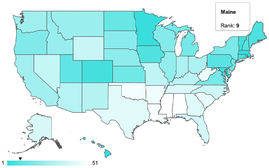Gov. LePage submits bill to boost his successor's salary
 Courtesy / Matthew Gagnon, Wikimedia Commons)
Gov. Paul LePage has proposed a bill that would raise the governor's salary from $70,000 to $150,000, beginning with whoever is elected as his successor in November.
Courtesy / Matthew Gagnon, Wikimedia Commons)
Gov. Paul LePage has proposed a bill that would raise the governor's salary from $70,000 to $150,000, beginning with whoever is elected as his successor in November.
Gov. Paul R. LePage wants to give a pay raise to Maine’s next governors.
In a news release sent out on Wednesday. LePage’s office reported that the governor has submitted a bill, LD 1878, “An Act To Increase the Annual Salary of the Governor and To Increase the Per Diem Meal and Housing Allowances Paid to Legislators," to the Legislature to raise the salary for future governors of Maine.
“The governor of the State of Maine is the chief executive of our state, and the compensation for the office should be competitive to attract the best talent,” LePage said. “Maine deserves a governor with executive leadership experience who is in the prime of their career. Leaders who would make excellent governors have told me they won’t consider running because of the pay cut. Competitive compensation is good public policy.”
The bill will have no effect on Gov. LePage’s salary or retirement. LePage, whose term ends in November, makes $70,000 a year.
A 2018 analysis reported by MoneyTalksNews last October ranked Maine 50th out of the 50 states with a $70,000 governor’s salary. By comparison, the next-lowest governor’s salary is Colorado at $90,000.
Here’s what governors get paid in the other New England states, according to MoneyTalksNews: New Hampshire, $110,834; Rhode Island, $132,710; Connecticut, $150,000; Massachusetts, $151,800; Vermont, $160,135.
“Now is the right time to address this, before Maine’s next governor is elected,” LePage said. “Raising the governor’s salary to $150,000 starting next year would place Maine in the middle of the pack, just below the New England average for 2019 and slightly above the national average.”
Within the same bill, LePage also calls for increasing the meal-and-lodging allowance for legislators who must stay overnight in Augusta from $70 to $125.
“The current cap on lodging allowance is $38 per night, which is outdated,” LePage said. “While serving as an elected official is meant to be an act of public service, we should not expect legislators who travel great distances to Augusta to represent their communities to have to dig into their own pockets to cover the costs of staying overnight rather than drive several hours back home each day.”














Comments